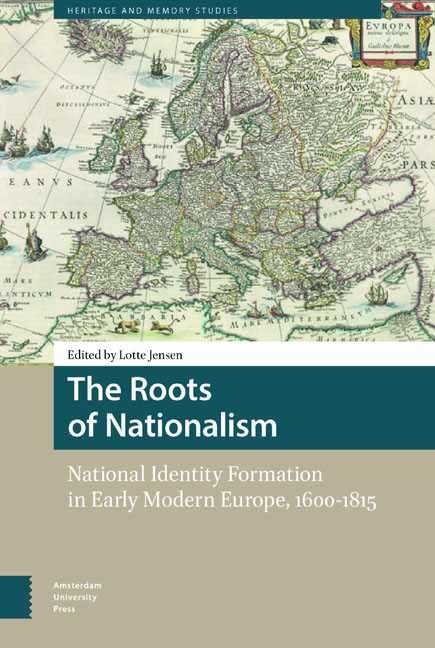Book contents
- Frontmatter
- Contents
- The Roots of Nationalism: Introduction
- Part One The Modernist Paradigm Contested
- Part Two The Genealogy of National Identity
- Part Three Negative Mirror Imaging
- Part Four Maps, Language and Canonisation
- Part Five Nation in the Age of Revolution
- List of Illustrations
- List of Contributors
- Index
4 - The Chronicler’s Background: Historical Discourse and National Identity in Early Modern Spain
Published online by Cambridge University Press: 03 February 2021
- Frontmatter
- Contents
- The Roots of Nationalism: Introduction
- Part One The Modernist Paradigm Contested
- Part Two The Genealogy of National Identity
- Part Three Negative Mirror Imaging
- Part Four Maps, Language and Canonisation
- Part Five Nation in the Age of Revolution
- List of Illustrations
- List of Contributors
- Index
Summary
From antiquity until the modern age, the national background of the historian, and the extent and ways in which this might have determined his work, was an important and controversial issue in historiographic theory. The rise of official historiography in sixteenth- and seventeenth-century Europe led theorists to give serious thought to the key prerequisites of the state historian. Not only was he required to have political and military experience, literary skills and extensive knowledge of the ruling dynasties, the lands and peoples that he had to write about, but he also had to demonstrate his loyalty and commitment to them. And, like all good historians, the official chronicler was expected to be truthful, objective and fair. The fact that the writer was native-born was normally regarded as a guarantee of knowledge and ideological and emotional adherence to the object of his study; however, one also needed to consider that there was a greater risk that the historian's affinities and feelings for his community might compromise his professional integrity if he were native-born rather than foreign.
My aim is to give an account of the development of this debate in sixteenth- and seventeenth-century Spanish historiographic theory. I shall try to show that the debate about the chronicler's naturaleza evolved along with the changes that affected the ideas and uses of early modern historiography and in line with the dominant interests and biases of a wider and more complex ideological and disciplinary discourse. The objective of this discourse, conditioned, in turn, by the political relations and international image of the Spanish monarchy, was the nationalisation of the official historiography of the Habsburgs, a process that its architects understood as the necessary precondition for the creation of a historical past on which to base Spanish national identity.
Nebrija and the Italian chroniclers
At the beginning of the sixteenth century, the Sicilian Lucius Marineus Siculus (1460-1533) and the Spaniard Antonio de Nebrija (1441-1522), both professors at the University of Salamanca, were engaged in a bitter dispute over who should become the official chronicler of the history of the Catholic Monarchs, Ferdinand and Isabella, sovereigns of the crowns of Castile (1474- 1504) and Aragon (1479-1516).
- Type
- Chapter
- Information
- The Roots of NationalismNational Identity Formation in Early Modern Europe, 1600–1815, pp. 87 - 108Publisher: Amsterdam University PressPrint publication year: 2016



